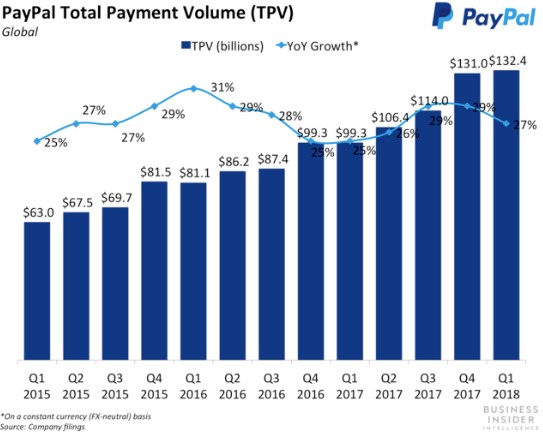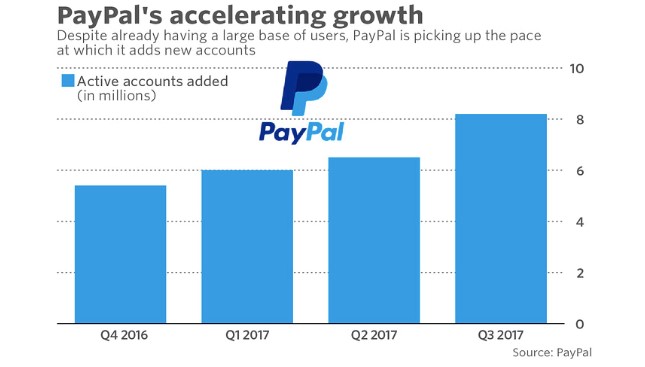Auction giant eBay may be transitioning away from PayPal, but investors shouldn’t be concerned: PayPal is a beast of quite another breed, and this divorce is merely the next phase in PayPal’s ambitious fintech evolution.
When eBay originally announced it would fast-track and end to its contractual relationship with PayPal in late January, PYPL lost 8 percent of its share price in an immediate knee-jerk reaction.
But that didn’t last long, and so far this year, PYPL stock is up more than 8 percent. With $132 billion in total payment volume in Q1 2018—a 27-percent increase year-over-year, helped by a 35-percent increase in active users—PayPal is on a tear.

(Click to enlarge)
Source: Businessinsider

(Click to enlarge)
After a marriage that lasted for a decade-and-a-half, eBay decided in January not to renew its contract with PayPal when it ends in 2020 and instead strike a deal with Amsterdam-based Adyen. For PayPal, it means eBay will still let customers use this payment option, but Adyen will process all eBay transactions and PayPal’s status will be diminished.
But PayPal doesn’t really need eBay anymore. Still, it’s worth recalling that at one time—around 2014—more than 30 percent of PayPal’s profits and 50 percent its revenue were coming from eBay.
Some would argue that a lot has changed at PayPal since then, though. And while the loss of eBay might prick a bit, PayPal has much bigger fintech things on the horizon, which is exactly why activists investors were keen to see the marriage end.
But Q1 2018 earnings are nothing compared to what’s come since then, and what’s coming down the road.
On May 25, PayPal held its first analyst day of the year. Hints were of future acquisitions and share buyback plans. A day later, two analysts raised their price targets on the stock, upgrading it to a buy. PayPal’s getting a lot of love, and there seems to be plenty more to go around. The eBay breakup wasn’t even an issue. Related: The Healthcare Fiasco Costing The U.S. $700B In Subsidies
The analysts were astute. On May 29, PayPal announced another acquisition—its second announcement this month alone—saying it had acquired Jetlore, an artificial intelligence-powered predictive platform for retailers. Jetlore is used by Nordstrom Rack and Uniqlo, and it’s all about marketing solutions.
“We share Jetlore’s passion for creating amazing – and personalized – customer experiences and believe their capabilities will accelerate our ability to help merchants optimize content and communication for their customers,” PayPal said in a statement.
Less than two weeks ago, PayPal announced it would acquire Swedish tech company iZettle for $2.2 billion, boosting its expansion potential globally and raising the bar for competition in the lucrative global payments industry (look out, Square).
The Swedish company has its own mobile-phone hardware for accepting credit card payments and also reaches into software and financing services for small business--and it will help California-based PayPal expand further in both Europe and Latin America.
And now it’s planning some major tweaks, first and foremost by strengthening its relationship with giant-of-giants, Google.
While PayPal has been available on Google since 2014 and customers can already integrate their PayPal accounts directly into Google’s mobile wallet, Google Pay, it’s about to get a lot bigger. By the end of this year, the plan is to allow customers to extend that seamless integration into bill pay and peer-to-peer payments for everything from Google Pay and Gmail to Google Store and YouTube.
The eBay breakup may have seemed like a negative, but at the end of the day, it gives PayPal more room to breathe—and grow. It doesn’t mean PayPal won’t still be seeing eBay, it just means that the new contract doesn’t include a ‘most-favored nation’ pricing match. For PayPal, that means better positioning to compete for new marketplace acceptance contracts, Jeffries analyst Ramsey El-Assal wrote in a note to clients carried by Business Insider.
PayPal’s ambitious moves to position itself in every aspect of our financial lives makes it an investor darling, and tying the knot in the Google relationship could take that much further than any eBay contract.
By Michael Scott for Safehaven.com
More Top Reads From Safehaven.com
















